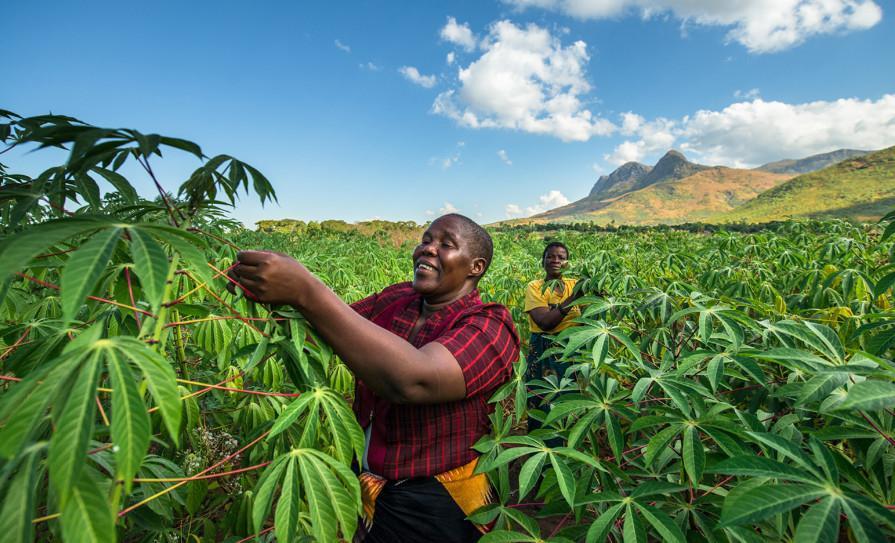(单词翻译:单击)
听力文本
Refugee Grows African Eggplants in US
Janine Ndagijimana's parents came from Burundi. But she was born in a refugee camp in Rwanda, a neighboring country. In 1994, her family fled Rwanda at the start of the genocide and settled at another refugee camp in Tanzania.
Ndagijimana arrived in the United States in 2007. She settled in the northeastern state of Vermont and began to dream of farming. While deciding what to plant, she thought back to her time in Tanzania.
It was at the refugee camp that she considered growing African eggplants, known as "intore," in her native Kirundi language. She bought vegetables from farmers and sold them at the refugee markets. She saw that growers of African eggplant were making a lot of money, but she did not have the land to grow the fruit herself.
Ndagijimana remembered how a person would receive just 3.6 kilograms of food, which was usually only corn and beans, to eat for two weeks.
"Life was not easy because even the food they provided was not enough for one person," she said.
To support her family
Vermont is one of the least culturally or racially diverse states in the U.S. Its population is 95 percent white.
In Vermont, she was able to use about 0.4 hectares of community garden. Later, a farmer leased her another 0.8 hectares for free.
"This is to support the family," she said. She hopes that when the business gets bigger she can use the money she makes to send her children to college.
Since Ndagijimana planted her first crop in 2013, she has sold her 2,270-kilogram harvest through the mail to Africans in Arizona, Texas, Utah, Michigan and Idaho.
She is part of a growing number of farmers who have successfully used social media and the internet to sell crops from their home countries in the U.S.
The U.S. Committee for Refugees and Immigrants said that other refugee communities also are growing and selling native crops around the U.S. For example, Burmese and Bhutanese farmers are raising and selling eggplants, peppers and herbs in Lowell, Massachusetts. In Dearborn, Michigan, Syrian and Iraqi refugees are growing peppers and mint.
Expanding her business
Ndagijimana hopes to eventually farm on 4.1 hectares. She has received help from a program called New Farms for New Americans. The program receives support from the U.S. Department of Agriculture and the University of Vermont, or UVM.
Ben Waterman, of the UVM Center for Sustainable Agriculture meets with her weekly. He said she has also been teaching people how to copy her business model.
"Janine does her research and she really kind of weighs her options and makes use of a lot of the resources around here," Waterman said.
I'm Phil Dierking.
重点解析
1.refugee camp 难民营
A sandstorm in a refugee camp near the border of Somalia.
一场沙尘暴席卷了索马里边境附近的一个难民营。
2.dream of 梦想
I still dream of the white line though.
当然我还总是梦想着那根终点的白线。
3.business model 商业模式
Great change in the network marketing business model, led to changes in economic development.
网络营销极大的改变了商业模式,带动了经济发展的变革。
4.social media 社交媒体
We have all witnessed the power of social media.
我们见证了社交媒体的实力。
5."Janine does her research and she really kind of weighs her options and makes use of a lot of the resources around here," Waterman said.
makes use of 利用
He makes use of the Internet to collect farming technology as well as market information.
他利用互联网收集农业技术和市场信息。
The machine makes use of the principle of digital sorting.
这台机器运用了数字分类法原理。
6.She is part of a growing number of farmers who have successfully used social media and the internet to sell crops from their home countries in the U.S.
a growing number of 越来越多的;不断增长的
A growing number of adults find themselves not only parenting their children, but providing care for their parents as well.
越来越多的成年人发现自己不仅要照顾好孩子,而且还要关照好自己的父母。
The international community will also have to cope with a growing number of environmental refugees.
环境因素造成难民数目不断增长,这是国际社会也要面对的。
参考译文
难民在美国种植非洲茄子
珍妮·恩达吉吉马纳(Janine Ndagijimana)的父母来自布隆迪。但她是在邻国卢旺达的难民营里出生的。1994年的种族大屠杀开始时,她的家人逃离卢旺达并在坦桑尼亚的一处难民营里定居下来。
2007年,恩达吉吉马纳抵达美国。她在美国东北部的佛蒙特州定居下来,开始打算务农。在决定种植什么作物时,她回忆起在坦桑尼亚的时光。
考虑种植非洲茄子时她还身处难民营里,她的母语基隆迪语称这种作物为“intore”。她从农民手中购买蔬菜,然后在难民市场上出售。她看到种植非洲茄子的农民赚了很多钱,但她没有土地可种植。
恩达吉吉马纳还记得,一个人两周内只能吃3.6公斤的食物,通常只有玉米和豆类。

她说,“生活不易,因为他们提供的食物还不够一个人吃。”。
佛蒙特州是美国文化和种族多样性最少的州之一。其总人口中有95%为白人。
在佛蒙特州,恩达吉吉马纳只能利用约0.4公顷的社区菜园。后来,一位农民又免费租给她0.8公顷的土地。
“这是为了养家糊口,”她说。她希望生意越做越大时,可以用赚的钱送孩子们念大学。
自从2013年恩达吉吉马纳种植了第一批作物以来,她已经通过邮递把2270公斤的收成卖给了亚利桑那州、得克萨斯州、犹他州、密歇根州和爱达荷州的非洲人。
如今,越来越多的农民利用社交媒体和互联网在美国销售他们的本土作物,恩达吉吉马纳就是其中一员。
美国难民和移民委员会表示,美国其他的难民社区也在种植、出售本土作物。例如,缅甸和不丹的农民在马萨诸塞州洛厄尔种植并出售茄子、辣椒和草药。在密歇根州迪尔伯恩,叙利亚和伊拉克难民种植辣椒和薄荷。
恩达吉吉马纳希望最终能耕种4.1公顷土地。她接受了“新美国人新农场”项目的帮助。该项目得到了美国农业部和佛蒙特大学(UVM)的支持。
佛蒙特大学可持续农业中心的本·沃特曼每周跟珍妮会面。本表示,她还教人们如何复制她的商业模式。
“珍妮做了研究,也权衡了自己的选择,并利用了这里的很多资源,”沃特曼说。
菲尔·迪尔金为您播报。
译文为可可英语翻译,未经授权请勿转载!


